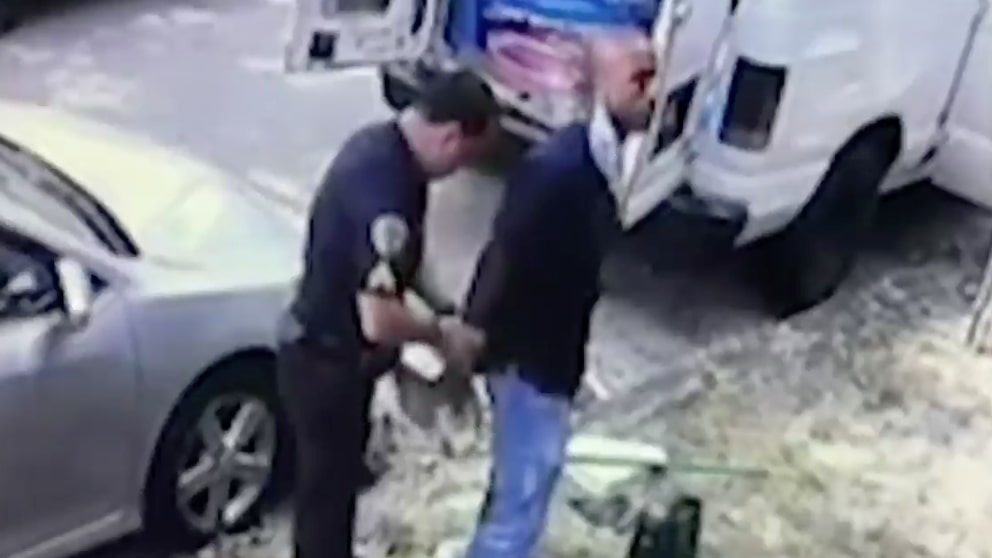Miami-Dade Police Chief Jorge Colina announced that an investigation is underway for a police officer who allegedly handcuffed a Black doctor as he loaded his van with medical supplies for the homeless community.
Colina addressed the situation after a video began to circulate of a white officer handcuffing Dr. Armen Henderson, an internal medicine physician at the University of Miami Health System.
Henderson has dedicated his time to testing the homeless for COVID-19 and providing resources for the vulnerable population across Miami. On Friday, as he was loading his truck, a police officer put him in handcuffs outside of his home for no apparent reason.
Henderson was profiled by the Miami Herald less than two weeks ago for his selfless work helping the homeless community in downtown Miami.
Video footage of the incident circulated because of Henderson's work in the community and the nature of the incident. The 34-year-old doctor was outside of his home loading supplies into his van when an unnamed police sergeant drove by and stopped near him.
“He just said, ‘Are you littering over here?’ Do you live here? Do you work here?’ And I was like, ‘Yes, I live here. This is where we put our bulky trash and the city comes to pick it up every week at this same place. I’m like, 'OK, thank you officer,'" Henderson told ABC News.
"And then I turned around to get back to what I was doing. I guess he must have thought that I had disrespected him or something like that. He jumped out of the car and started yelling, 'You call me sergeant when I'm talking to you, and blah, blah, blah. And, you know what, give me your ID,''' he said.
Henderson didn't have his ID on him, so the officer handcuffed him. Henderson called out to his wife who was inside their Flagami neighborhood home with their children.
Once his wife brought his ID out to the sergeant, Henderson was uncuffed and the officer drove off without saying anything.
Dr Armen Henderson arrested in Fl while delivering supplies to the homeless is bad enuff, the ignorant cop no mask all https://t.co/HUcOpi6es4 his face talkn shyt pic.twitter.com/q9TFYwBXkS
— Iamsummer (@summerisunique) April 12, 2020
After the video racked up thousands of views, the Miami Police Department opened an investigation into the incident.
We are aware of a video circulating on social media involving one of our patrol sergeants handcuffing a resident in the Flagami NET area. An internal affairs investigation is underway and is looking into the incident.
— Miami PD (@MiamiPD) April 11, 2020
Colina eventually spoke about the incident himself, justifying the detaining by claiming that police had gotten reports of illegal dumping in the neighborhood.
“We have had a litany of complaints pertaining to illegal dumping. The commissioner from that area has received many complaints as well from the constituents. There is a cargo van that’s parked in front of that home where there appears to be trash that’s being offloaded. That is the genesis of the stop. Now, what’s happened after that, what’s being discussed, the actions taken, etcetera…all that needs to be investigated and it will be investigated," Colina said in a Facebook video.
Henderson told ABC News that he was now worried about his health because the officer did not have on a mask or gloves and got in his face during the incident. Multiple officers in the Miami Police Department have tested positive for the coronavirus in recent days, and 125 officers are being quarantined, ABC News reported.
''My hospital is becoming fuller and fuller, more and more people are coming in for COVID-19. I take care of the bulk of those patients just because I work at night. The majority of the patients that I’m seeing right now are COVID-19. It’s ironic because the police department released a whole video that morning saying, 'We thank first responders.' But even if I wasn’t a doctor, why do you feel the need to stop me during a pandemic? Don't you have other things to do?" Henderson said, explaining that all he was trying to do was help people through his medical work.
The incident is indicative of larger concerns Black communities across the country have about increased police presence and action as governments try to get people to stay inside and follow social distancing orders. The new governmental rules about masks and shelter-in-place orders have led to fears that police violence will increase in Black communities.
Despite the traumatizing altercation, Henderson told ABC News he was still focused on helping the homeless community during the crisis.
"We’ve been out there once or twice a week for the last four weeks, handing out tents, toiletries, masks, socks. We’ve been testing individuals for COVID-19 because it’s the most vulnerable population. If you want to control the spread you have to go right to the source and take care of these individuals first," Henderson said.
